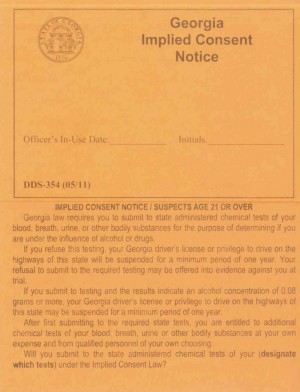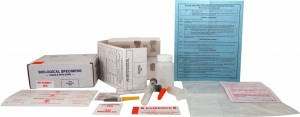If you have been arrested for a DUI in Georgia, experienced DUI trial attorney James “Skip” Sullivan is available to discuss your case anytime – including after-hours, weekends, and holidays! Call us at 404.816.8777
A common question we hear from our clients is: “can the police take my blood in a Georgia DUI case?”
There are four ways law enforcement can try to obtain a blood sample or test result in a Georgia DUI case:
- Voluntary consent
- Implied consent notice
- A search warrant to take a biological sample (like blood or urine)
- A search warrant for your medical records (where law enforcement uses chemical test results from a medical/hospital blood draw contained in the medical records against a DUI suspect in court)
We vigorously challenge each of the ways that law enforcement may have obtained a blood sample or chemical test result in a Georgia DUI case.
Voluntary consent to submit to a blood test:
Before July 1, 2006, there was no statute in a Georgia DUI case governing whether law enforcement can obtain a blood test by voluntary consent, bypassing the Georgia Implied Consent law. The current status of Georgia law is unclear as to under what circumstances this method of obtaining a chemical test by the police can be used. Our firm’s Padidham v. State case, decided by the Georgia Supreme Court, gives a strong indication that the Implied Consent notice must be read to a defendant when arrested in a DUI case. Most certainly voluntary consent can be used before an arrest is made where the police may not be able to establish sufficient probable cause to charge someone with DUI. Regardless as to whether voluntary consent is actually given before or after arrest to provide a sample, the trial court still needs to weigh factors to determine the voluntariness of the consent given by a suspect to obtain a sample, be it blood, breath, or urine. Those factors are similar to factors weighed to determine the admissibility of statements in response to Miranda warnings or consent to search other things/places like a house or vehicle.
Georgia implied consent notice:
The implied consent notice is a statutory scheme put in place in Georgia to make it easier for law enforcement to get a sample of your blood, breath, urine, or other bodily substances to help prove their case. In Georgia, the implied consent statute has evolved many times over the years since it first became a statute in 1968. The implied consent statute only applies where the officer has sufficient “probable cause” to believe the offense of DUI has been committed. In a typical DUI case where no one has died or been seriously injured, a person suspected of being DUI must first be placed under arrest for DUI or for an offense that arose out of the DUI case. The officer must then read the implied consent notice at the time of arrest unless there is some exigent circumstance that warranted the delay of the reading of the notice. When this notice is read, the officer advises a Georgia DUI suspect of certain rights and penalties with respect to the Implied-Consent notice. If the suspect agrees to take the test designated by the law enforcement officer, that person is then entitled to his or her own test of their breath, blood, urine, or other bodily fluids at their own expense and from qualified persons of their own choosing after they take the officer’s requested test. Law enforcement must also make reasonable accommodations to transport the accused DUI suspect to get their own test.
If a driver refuses the state’s test, the implied consent statute specifically states “no test shall be given” – meaning the State can’t get their test via the Implied Consent notice and you can’t get your own test if you are still in police custody (a driver can most certainly get his or her own test once released from police custody if it is not too late to render the test meaningless). The legal issue is whether law enforcement can get a search warrant for your blood or urine after the Implied Consent notice is read and you refuse the state-administered test.
A search warrant for blood/urine:
A 2006 amendment to the implied consent statute has language indicating that law enforcement can get a search warrant in a Georgia DUI case, however, the Georgia legislature decided to leave in the language that is a suspect refuses the State’s test, then no test shall be given. Law enforcement and prosecutors have determined that the statutory change adding language for search warrants gave law enforcement the power to obtain search warrants. Many Georgia jurisdictions including Atlanta, Cobb County, Dunwoody, Gwinnett, Cherokee, Athens, Rockdale, Douglas County, and more have been seeking and obtaining search warrants to draw and test blood in DUI cases where a driver refused to take the State’s test under the implied consent law. Our firm takes the position that law enforcement can obtain search warrants in a Georgia DUI case for things like medical records to discover hospital or medical chemical test results (discussed below). Law enforcement can even get a search warrant in DUI cases to obtain and test bodily substances like blood or urine, but only in limited circumstances. Our DUI lawyers at Chestney & Sullivan Law Firm are actively challenging the use of search warrants for blood/urine in DUI cases in court and we expect that the Georgia Supreme Court will have to ultimately decide the issue of its use.
Search warrant for medical records:
In a Georgia DUI case, the only time we see this issue arise is if a person charged with a DUI was injured in an accident where they received medical care or had some other reason to need medical treatment following an accident or a DUI arrest. Up until the early 2000s, prosecutors would simply use the court’s power of subpoena to have medical records presented in court. That changed after a series of Georgia appellate decisions that resulted in prohibiting that practice by law enforcement and prosecutor offices. Now prosecutors or law enforcement must get a search warrant from a judge to obtain these types of records. Law enforcement or the prosecutor’s office seeking the search warrant now must present sufficient evidence to a judge that the records sought are material to the case, that a chemical test is likely to be in the records, and that there is sufficient probable cause to believe a crime was committed. Defense challenges can be made by attacking the validity of a search warrant if it was not obtained and executed properly – which may lead to the exclusion of the chemical test evidence.
Call our experienced Georgia DUI lawyers today:
Mr. Chestney is one of the few attorneys in Georgia who is board-certified in DUI defense. If you face Georgia DUI charges, you need an experienced Georgia DUI attorney who knows how to fight these cases. Whether you know you are innocent, or even if you feel you cannot avoid conviction, contact us at 404-816-8777 for the experienced support you need for your case. We offer a free consultation.








